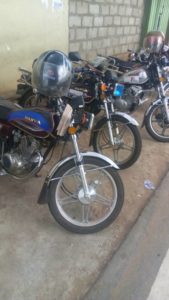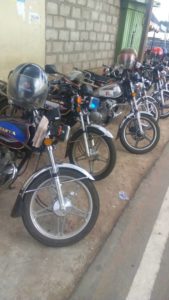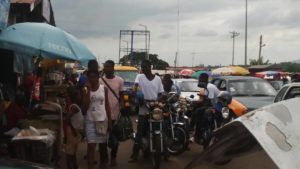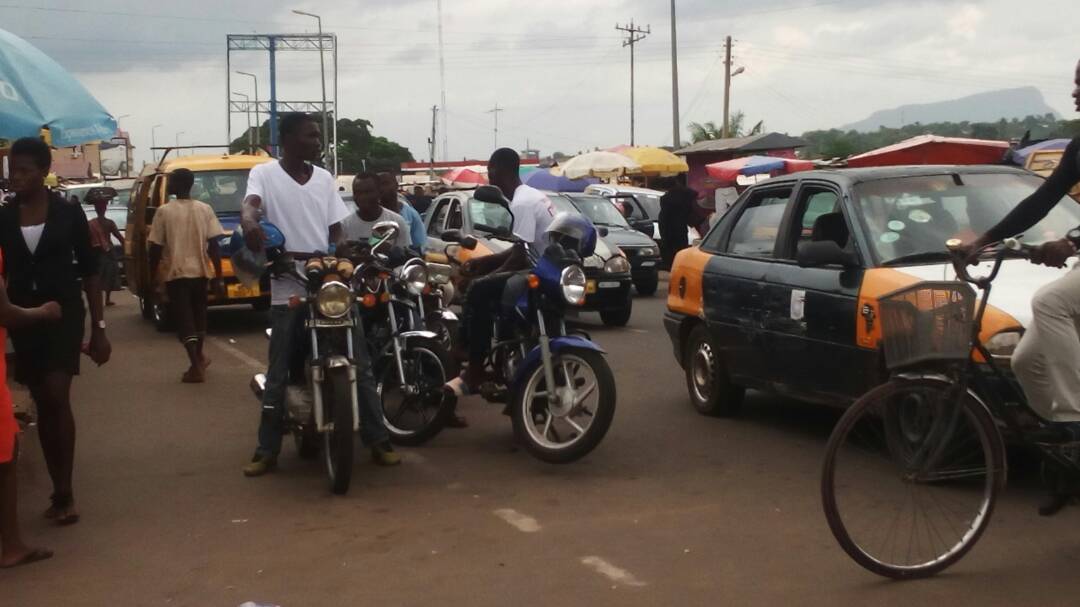Over the years, motorbikes have increasingly been used to transport persons and goods from one destination to another. Individuals use these motorbikes and there are others who operate motorbikes for commercial purposes.
Commercial Motorbike though not currently permitted in the country, has seemingly been accepted by a section of Ghanaians especially those it benefits and they point to lots of reasons why it must be legalized.
Under the watch of the immediate past government, a strong advocacy came for reviewing the current Motor traffic regulations to legalize motorbikes for commercial purpose, popularly known as ‘’okada’’ in the country.
Recently, some Members of Parliament from rural constituencies argued strongly for the legalization of the okada for the potentials it has to facilitate transportation in their areas. Just a couple of months ago, the Deputy Transport Minister, Titus Glover reiterated the call for the legalization.


The motion though it had been laid in Parliament since 2015, has had no effect till date. This has generated a lot of public concern from the citizenry with many taking to social media platforms to get their concerns heard while stakeholders in the road transport industry were recorded for being against the okada business in the country.
Although Parliament has not amended Section 128 [1] of the Road Traffic Regulations Act 2012, which states that “The licensing authority shall not register a motorcycle to carry a fare paying passenger,” the use of motorbikes and tricycles for commercial purposes has become the new source of employment among many Ghanaian youth.
During my recent tour, I observed young people from the ages of 17 and above have now involved themselves into the okada business both in the urban areas and deprived communities. Some of these motorists are unemployed graduates, skilled and unskilled, and school drop-outs who are trying to make ends meet.
The use of motorbike in Ghana
Some years back, the use of motorbike was common among rural folks and some public and civil servants who used it as a mean to transport themselves to their workplaces. It would be recalled that motorbikes were also given to teachers to support their finances in the Single Spine Salary Structure (SSSS).
While rural famers use it to convey their produce in and out of their farms; health workers also use it to extend services to people in the hinterlands.
However, the past few years have seen a massive rise in the use of motorbikes and tricycles for commercial purposes. For instance, in Accra, Ho and some parts of the Volta Region, okada business is on exponential rise with the operators spread along the streets battling with taxi and bus drivers for passengers.
In the Volta Regional capital, Ho, for instance, the CK Road junction, Central Market, Ola SHS gate and Fiave areas have become okada terrains within the municipality with operators pitching camps along those stretches day and night in search of passengers.

For some traders in the city, okada especially the tricycle transportation is fast and convenient in conveying of goods and economical compared to taxi fares.
Lawrence Kwame, a university student and a resident of Ho, explained why he loves to travel on motorbikes anytime he is in Volta region. He complained that most taxi drivers charge fares that he cannot afford as a student.
He said he was rescued at a time from armed robbers who used taxi to operate in the night within the municipality when he was on vacation. He therefore added his voice to the call of legalising okada which he believes will help curb unemployment.
While few people expressed the fear and danger okada exposes them to, majority cared much about how to reach their destinations in time without being stuck in traffic.
Gasa, a 25-year old motorist, dropped out of school in primary 6 and migrated to Ho. He engaged in several activities to earn a living but finally settled on commercial motorbike operation. However, he complained the okada business is not lucrative as his daily earnings are enough to cater for just his basic needs.
Advocacy against commercial use of motorbikes
Although the debate and opinions on the legalization of okada continues, the officials of Ghana Police’s Motor Traffic and Transport Department (MTTD) and Driver, Vehicle and Licensing Authority (DVLA) have strongly spoken against the legalization of motorbikes and tricycles for commercial use.
These two bodies came out with results that over the years, 1,199 persons/pedestrians were knocked down by 1,289 motorbikes.
Furthermore, the National Road Safety Commission (NRSC) released some figures which revealed that 2,571 people were knocked down by motorists in 2014 leaving 1,856 dead and in 2015, 2,289 motorcycles were involved in road accident nationwide.
Currently, more than 700 people lost their lives from 4,049 road accidents making about 3,983 sustaining various degrees of injury.
The legal perspective
The laws of the land prohibit an individual from using motorbike or tricycle for commercial purposes apart from delivery and courier services. Both offenders and fare paying pillions are liable to imprisonment or fines.
The debate
The debate still ranges on the legalization of motorbike for commercial use. Those in support are calling for its legalization citing its potentials in curbing the unemployment menace rearing its face across the country in addition to bad nature of some roads which makes them difficult to be accessed by cars with motorbikes as the only option.
Those against its legalization on the other hand believe it will rather encourage many young persons to drop out of school, breed criminal activities and lead to carelessness on the roads.
But the question still remains. Will legalization of motorbike in Ghana serve as mode of transport and a source of employment for the teeming youth or will it be a death trap?
By: Albert Kuzor/voltaonlinegh.com




